旅游英语Unit_图文
第一章 unit 1 《新编旅游英语教程》 PPT课件
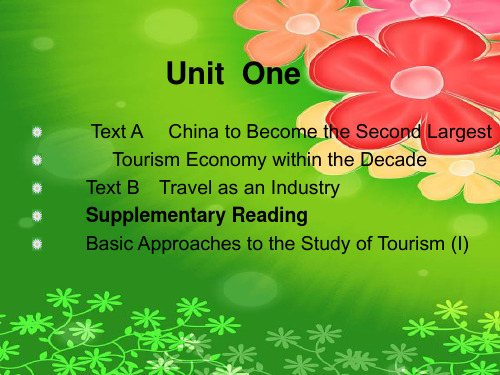
confine fare charter supply accessible location cruise excursion freighter ferry
v. n.
v. n.
adj. n. n.
n. n. v.
限制, 禁闭 费用, 旅客, 食物
租, 包(船、车等) 补给, 供给, 供应品
易接近的, 可到达的 位置, 场所, 特定区域 巡游, 巡航
Text B Travel as an Industry
Notes
Using smaller airplanes, air taxi companies fly passengers or supplies to destinations that may not be accessible to scheduled air carriers. 飞机出租公司用小型飞机把乘客或 货物运送到航空公司无法抵达的地方。 Oslo奥斯陆:是挪威首都和最大的城市。 1952年冬季奥林匹克运动会在此举行。
游览,短途旅行 货船 渡运, (乘渡船)渡过, 运送
Text B Travel as an Industry
riverboat
n.
内河船
underpinning n.
基础, 支柱, 支撑
rental
adj.
租用的
limousine
n.
豪华轿车
mass
adj.
大规模的, 集中的, 群众的
transit
Text A China to Become the Second
Largest Tourism Economy within the
Decade
Notes
《旅游英语》配套的课件Unit 1
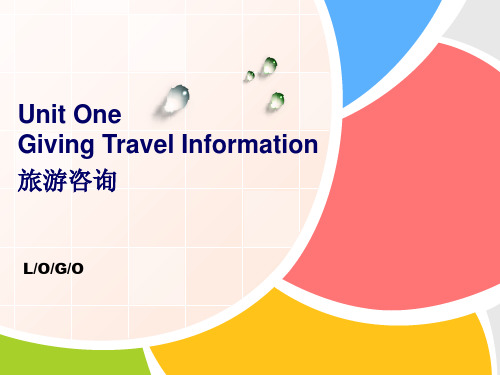
about travel information; • ——get some cultural knowledge about travel
information; • ——find ways to improve your writing skills
we’ll contact you by telephone. • 5. Will you please sign there, on _ the upper left-hand side_?
参考译文
• A:您好,要预订船票吗? • B:下星期有开往汉堡的船吗? • A:有,下星期三纽卡斯尔号将由南安普顿开往汉堡。 • B:好的,能给我订一间二人船舱吗? • A:我看一下。是的,可以〔指船舱位置图表〕这间怎么样? • B:这间很好,我订了。 • A:请您填好这张卡片。 • B:〔填好之后〕好了,给您。 • A:请您坐等一下,我来填写票单,只一会儿就好。 • B:那劳驾了。 • A:这是您的票。一共50英镑。 • B:给您钱。我们什么时间可以登船呢?您能告诉我怎么样登船吗?有登船专列吗?如果有的话,
Ming Tomb • 2. What are the characteristics of the landscape in Guilin? • The landscape is characterized by terraced rice paddies, water
buffalos, and bamboo groves, and peasants with turn up trousers and cone-shaped straw hats. • 3. Give a brief introduction to the Yangtze River. • Yangtze River is the largest river in China, the lifeline of China, which flows through nine provinces, with its 700 tributaries, covers an area of 1.8 million sq. km, which is 19 percent of the total area of China. • 4. Which city is known as the “City of the Sun〞? • Lhasa. • 5. What are the ancient mysteries of the Silk Road people can discover? • Bazaars where merchants haggle over camels and carpets, where you can meet the nomadic minorities of China, and
旅游英语课件Unit 1 Travel and Tourism
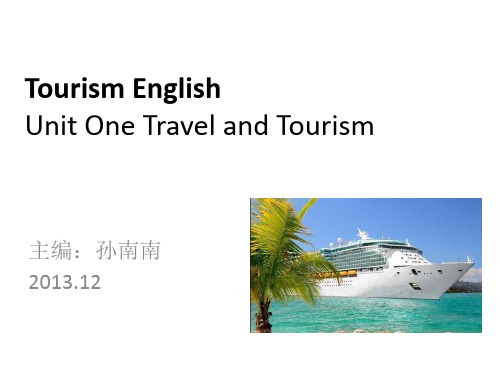
主编:孙南南 2013.12
Section A Passage Reading
Text A Travel Agency
Background Information:
1. Thomas Cook 近代旅游业之父 In 1841, as secretary of the South Midland Temperance
Section A Passage Reading
Text B Independent Travel
New Word: resident [ 'rezidənt ] n. 居民 bulk [ bʌlk ] n. 大部分,大块,容量 facility [ fə'siliti ] n. 设施,设备 book [ buk ] v. 预定,登记 at short notice 在短时间内,立刻 transfer [ træns'fə: ] n. 转让,转移,传递 baggage [ 'bægidʒ ] n. 行李
Package holidays are organized by a tour operator and sold to a consumer by a travel agent. Some travel agents are employees of tour operators, others are independent.
Association, Thomas Cook persuaded the Midland Countries Railway Company to run a special train between Leicester and Loughborough for a temperance meeting on July 5. He organized an excursion for his members at a fare of one shilling return. It turned out to be an immediate success—altogether 570 seats were sold. For his efforts Cook received a 5 percent commission. Although not the first excursion train run in England, it was believed to be the first publicly advertised excursion train organized by a middleman. Thus Thomas Cook ct rail excursion agent whose pioneering efforts were eventually to be copied widely in all parts of the world.
新职业英语《旅游英语1》Unit-3PPT优秀课件

Do a whole-class feedback, and get one or two Ss to give a brief report.
❖ The hotel is developed from the shell of an old post office. The owners aim to operate it as an innovative, stylish hotel, combining locally sourced and recycled materials with modern design. The materials used are part of the local environment—hardwoods and bricks from old Shanghai houses.
旅游 Unit 3 Check-in at the hotel 英语
Key
Reading A
Items Details
Items Details
Location Located in 1. the city center, close to Location Located in 1. the city center, close to
Reading A
Background Information
Sustainable travel is now in the first stages of yet another revolution—moving from eco-friendly greenhotels to completely carbon-neutral hotels. Hotels have long been cashing in ecofriendliness, touring things from energy-efficient light bulbs to dualflush toilets. Some of them really do care, and go out of their way to get LEED certification. But that still leaves at least some impact on the environment every time you stay at a hotel. The time has now come for every hotel to start offering a completely carbon neutral experience.
旅游英语ppt课件图片
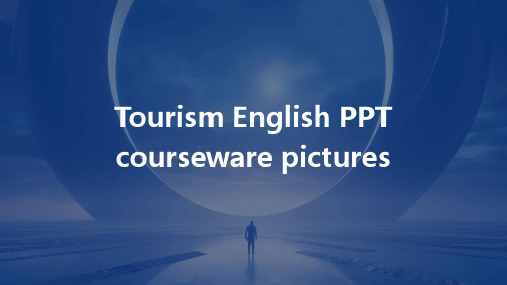
Pay attention to payment security
When using payment tools, pay attention to the surrounding environment to avoid disclosing personal information or passwords.
Leisure activities
01
Introduce various leisure activities such as SPA, massage, gym, etc., and provide English expressions.
Entertainment programs
02
Provide English entertainment program recommendations, such as concerts, dramas, movies, etc., to help learners enrich their travel life.
Detailed description
Natural scenery is one of the important attractions of tourism, such as magnificent mountains and rivers, clear lakes, beautiful beaches, and dense forests. These natural landscapes not only provide beautiful scenery, but also provide tourists with opportunities to get close to nature and experience its wonders and beauty.
新职业英语旅游英语Unit 1 ppt课件

旅游 Unit 1 Marketing and Preliminary Work 英语
Task 12
旅游 Unit 1 Marketing and Preliminary Work 英语
Task 1 Being a tour guide, you should know what to prepare before
旅游 Unit 1 Marketing and Preliminary Work 英语
Reading A
Task 1 Match each type of tourism with its corresponding picture.
Try to describe them in English briefly.
(c)— Agritourism: It is the practice of attracting travelers or visitors to an area or areas used primarily for agricultural purposes.
旅游 英语
T Unit 1 Marketing and Preliminary Work
Reading A
2. timeshare
A timeshare is a form of ownership or right to the use of a property. The property is typically in a resort area, and multiple parties hold rights to use it. Each sharer is allotted a period of time (typically one week, and almost always the same time every year) in which they may use the property.
旅游英语课件 Tourism
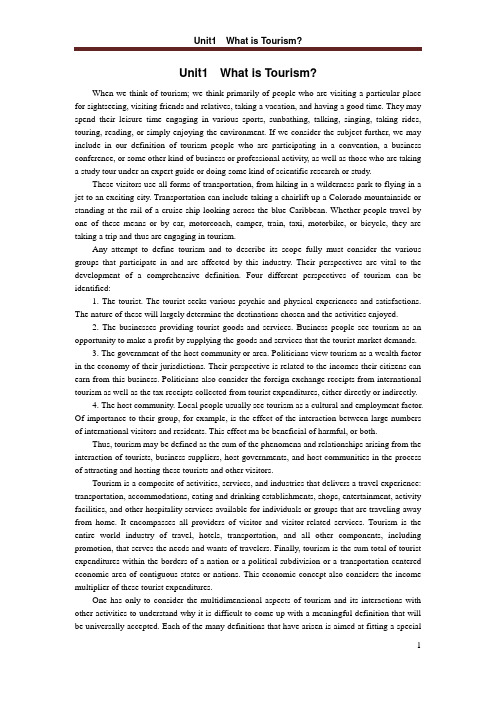
Unit1 What is Tourism?When we think of tourism; we think primarily of people who are visiting a particular place for sightseeing, visiting friends and relatives, taking a vacation, and having a good time. They may spend their leisure time engaging in various sports, sunbathing, talking, singing, taking rides, touring, reading, or simply enjoying the environment. If we consider the subject further, we may include in our definition of tourism people who are participating in a convention, a business conference, or some other kind of business or professional activity, as well as those who are taking a study tour under an expert guide or doing some kind of scientific research or study.These visitors use all forms of transportation, from hiking in a wilderness park to flying in a jet to an exciting city. Transportation can include taking a chairlift up a Colorado mountainside or standing at the rail of a cruise ship looking across the blue Caribbean. Whether people travel by one of these means or by car, motorcoach, camper, train, taxi, motorbike, or bicycle, they are taking a trip and thus are engaging in tourism.Any attempt to define tourism and to describe its scope fully must consider the various groups that participate in and are affected by this industry. Their perspectives are vital to the development of a comprehensive definition. Four different perspectives of tourism can be identified:1. The tourist. The tourist seeks various psychic and physical experiences and satisfactions. The nature of these will largely determine the destinations chosen and the activities enjoyed.2. The businesses providing tourist goods and services. Business people see tourism as an opportunity to make a profit by supplying the goods and services that the tourist market demands.3. The government of the host community or area. Politicians view tourism as a wealth factor in the economy of their jurisdictions. Their perspective is related to the incomes their citizens can earn from this business. Politicians also consider the foreign exchange receipts from international tourism as well as the tax receipts collected from tourist expenditures, either directly or indirectly.4. The host community. Local people usually see tourism as a cultural and employment factor. Of importance to their group, for example, is the effect of the interaction between large numbers of international visitors and residents. This effect ma be beneficial of harmful, or both.Thus, tourism may be defined as the sum of the phenomena and relationships arising from the interaction of tourists, business suppliers, host governments, and host communities in the process of attracting and hosting these tourists and other visitors.Tourism is a composite of activities, services, and industries that delivers a travel experience: transportation, accommodations, eating and drinking establishments, shops, entertainment, activity facilities, and other hospitality services available for individuals or groups that are traveling away from home. It encompasses all providers of visitor and visitor-related services. Tourism is the entire world industry of travel, hotels, transportation, and all other components, including promotion, that serves the needs and wants of travelers. Finally, tourism is the sum total of tourist expenditures within the borders of a nation or a political subdivision or a transportation-centered economic area of contiguous states or nations. This economic concept also considers the income multiplier of these tourist expenditures.One has only to consider the multidimensional aspects of tourism and its interactions with other activities to understand why it is difficult to come up with a meaningful definition that will be universally accepted. Each of the many definitions that have arisen is aimed at fitting a specialsituation and solving an immediate problem, and the lack of uniform definitions has hampered study of tourism as discipline. Development of a field depends on (1) uniform definitions, (2) description, (3)analysis, (4) predictions, and (5) control.Modern tourism is a discipline that has only recently attracted the attention of scholars from many fields. The majority of studies have been conducted for special purposes and have used narrow operational definitions to suit particular needs of researchers or government officials; these studies have got encompassed a systems approach. Consequently, many definitions of “tourism” and “the tourist” are based on distance traveled, the length of time spent, and the purpose of the trip. This makes it difficult to gather statistical information that scholars can use to develop a database, describe the tourism phenomenon, and do analyes. The problem is not trivial. It has been tackled by a number of august bodies over the years, including the League of Nations, the united Nations, the World Tourism Organization (WTO), the Organization for Economic Cooperation and Development (OECD),the National Tourism Resources Review Commission, and the U.S. Senate’s National Tourism Policy Study.World Tourism OrganizationThe international Conference of Travel and Tourism Statistics convened by the World Tourism Organization (WTO) in Ottawa, Canada, in 1991 reviewed, updated, and expanded on the work of earlier international groups. The ottawa Conference made some fundamental recommendations of definitions of tourism, travelers and tourists. The United Nations Statistical Commission adopted WTO’ recommendations on tourism statistics on March 4, 1993.TourismWTO has taken the concept of tourism beyond a stereotypical image of “h oliday-making.” The officially accepted definition is:Tourism comprises the activities of persons travelin to and staying in places outside their usual environment for not more than one consecutive year for leisure, business and other purposes.” The term u sual envi-ronment is intended to exclude trips within the area of usual residence and frequent and regular trips between the domicile and the workplace and other community trips of a routine character.1. International tourism:a. Inbound tourism: visits to a country by nonresidents.b. Out bound tourism: visits by residents of a country to another country.2. Internal tourism: visits by residents of a country to their own country.3. Domestic tourism: internal tourism plus inbound tourism (the tourism market of accommodation facilities and attractions within a country).4.National tourism: Internal tourism plus outbound tourism (the resident tourism market for travel agents and airlines).Traveler Terminology for International TourismUnderlying the foregoing conceptualization of tourism is the overall concept of traveler, defined as “any person on a trip between two or more countries or between twoor more localities within his/her country of usual residence.” All types of travelers engaged in tourism are d escribed as visitors, a term that constitutes the basicconcept of the entire system of tourism statistics. Visitors are persons who travel to a country other than the one in which they generally reside for aperiod not exceeding 12 months, whose main purpose is other than the exercise of an activity remunerated from within the place visited. Visitors are subdivided into two categories:1. Same-day visitors: visitors who do not spend the night in a collective or private accommodation in the country visited: for example, a cruise ship passenger spending four hours ina port.2. Tourists: Visitors who stay in the country visited for at least one night: for example, a visitor on a two-week vacation.There are many purposes for a visit, notably pleasure, business, and other purposes, such as family reasons, health, and transit.Wordschairlift an apparatus which carries people up and sown steep slopesin chairs that hang from a moving wire 升降椅;空中缆椅camper a motor vehicle big enough to live in when on holiday, use.Having cooking equipment and beds in the back part 野营车motorbike a motorcycle 摩托车psychic of the mind as opposed to the body精神上的jurisdiction the right to use the power of an official body, esp. in order tomake decisions on questions of law 管辖权;司法权,审判权composite something made up of different parts or materials 混合物,合成物encompass to include or be concerned with (a wide range of activities,subjects, ideas) 包含,包括;涉及subdivision the act of dividing something that has already been divided,or the parts that result from doing this 再分,细分contiguous (to, with) touching, next (to); having a shared borde(正式)接触着的,接近的;接壤的multidimensional 多维的hamper to cause difficulty in movement or activity 阻碍,妨碍;牵制trivial of little worth or importance 琐碎的,没有价值的august lit noble and grand 威严的;高贵的convene to call (a group of people, committee) to meet 召集(会议);召集开会stereotypical as in an overly simple picture or opinion of person, group, orthing老套的,旧框框的consecutive following in regular unbroken order 连续的,连贯的domicile formal or law a person’s home; the place where a personlives or is considered to live for official purposes[法]户籍,正式居住地,信处workplace the room r building in which workers perform their work工作场所;工厂;车间inbound AmE incoming; inward bound 进来的outbound mowing sway from the speaker or the starting point 外出的,离开出发点underlie to be a hidden meaning or cause of 位于……之下;成为……基础foregoing (the one) that has been mentioned 前面的(事物),刚提到的(事物)conceptualization something that form a concept or concepts of概念化remunerate to reward; pay (someone) for work or trouble(正式)给……报酬;补偿transit the going or moving of people or goods from one place toanother通行;过境Additional ReadingText A Mass TourismThe Historical SettingTourism harks back to the conquest of Alexander the Great (356-323BC) and the subsequent development of the Hellenistic urban system. It is argued that tourism requires both large claustrophobic cities and the means to escape from them, both of which were present in Greece during this period.Within modern times, the notion of tourism is closely linked to the idea of the “Grand Tour”, which spanned the 16th to 19th Centuries. The Grand Tour is a “tour of certain cities in Western Europe undertaken primarily, but not exclusively, for education and pleasure”. This later era of grand tourism was typified by long, expensive, “classical” and “romantic” visits, mainly by the British aristocracy, to France, Italy, Germany, Switzerland and the Low Countries. Over time, and with the rise of the middle professional class, the Grand Tour was patronized by a wider segment of the population. Nonetheless, only 3%~4% of the Population represented the nucleus from which Grand Tourists might have be drawn. The golden age of the Grand Tour was the 18th Century, particularly the 30 years before the outbreak of the French Revolution in 1789. By the 1830s, the length of the Grand Tour fell from an average of 40 months in the mid-16th Century to an average of only 4 months.The growth of tourism to “mass” proportions as it is known today, has its fo undation in several timely innovations: technologically in the field of transportation; and in the existence of a critical facilitating force, entrepreneurship-in the person of Thomas Cook.In 1815, 1 year after the Battle of Waterloo ended the Napoleonic wars, the first channel crossing by steamer was made (the site of the battle itself becoming a major tourist attraction). By 1812, a regular service was operated between the ports of Dover and Calais. In 1828 the first railways were laid in France and Aust ria, and in 1844 the railway reached Switzerland. “This revolution in Transport technology and the low cost, speed and efficiency that it provided, led to an immediate expansion of European tourism.”Complementing transportation technology was the existence of entrepreneurial talent, “initiative” and “organizing genius” in the person of Thomas Cook. “His originality lay in his methods, his almost infinite capacity for taking trouble, his acute sense of the needs of his clients, his power of invention and hi s bold imagination” (Young, 1973). It has been written that “thefather of modern tourism was unquestionable Thomas Cook” (English, 1986). “Cook was the perfect entrepreneur, a brilliant opportunist, quick to sense the need of his clientele…” (Turner and Ash, 1975). He was a true Schumpeterian entrepreneur-“a leader, a disturber of the peace”, who had the initiative, authority, foresight, and intuition and psyche to carry out innovations.Thomas Cook organized travel on a scale that had never been seen before. He heralded an era of organized, large-scale, relatively cheap tourism spread across national, regional and international destinations. If Europe had the “hot spots” for the Grand Tourists, the opening of the Far East, India and America, were the hallmarks of the Cook era. Until the early 1860s, Britain remained the main field of Cook’s activities; in 1862 he moved into Europe; he moved into America in 1866; took his first round-the-world trip in 1872; reached India and the Far East by the 1880s; and the first Cook hotel was established at Luxor (Egypt) in 1877.In 1862, the first true package tours were provided by Cook-all the details of transport and accommodation were pre-arranged for tourists who were, generally, of modest means. Spurred on by his example and the profits made by this entrepreneur, many imitators entered the fray. Turner and Ash write, for example, that ‘it was not long before his example was imitated; in 1863, the Stangen Travel Agency was established in Breslau. Stangen soon moved his center of operation to Berlin and became a successful rival to Cook’ (Tuner and Ash, 1975). By 19th –Century advances in transport technology, Thomas Cook and Son had effected a revolution in tourism by the end of the century. No longer the preserve of the wealth and the leisured, tourism was now an industry. While an average of 257 people per annum took part in Grand tourism during the 1547-1840 period (Towner, 1985), Cook had taken 20000 people to the Paris Exhibition of 1879-such was the magnitude of his entrepreneurial prowess.Despite the leaps and bounds that the industry experienced, tourism, until the 1930s, was still a matter of trains, boast and coaches. Travel by water transportation was a very important form of tourism during the 1920s and 1930s. The ships themselves were a form of floating hotel, where the act of travel was equated with tourism. Travel was seen as an end in itself. As if the industry has gone full circle, today, cruise tourism is one of the fastest growing segments of the international tourism industry.It was in 1950 that the first package holiday built around air transport was organized. This was undertaken by Vladimir Raitz, a Russian émigré educated at the London School of Economics. His successful company, Horizon Holidays (now merged with Thomson, the largest UK operator) was one of the top three tour operators in Britain. By the 1960s, the package holiday business began to use air transport in a major way as Raitz’s competitors, spurred on by his success also began using the aircraft.Still, foreign travel in the 1930s remained a luxury commodity within the reach of only a privileged few having both plenty of free time and considerable purchasing power. This picture was to change when, coupled with post-war peace and prosperity, came innovations in aircraft technology and changes in labor legislation, which provided paid holidays, and the development of the package tour. Aided by these innovations, mass tourism had arrived.Mass Tourism DefinedMass tourism is a phenomenon of large-scale packaging of standardized leisure services at fixed prices for sale to a mass clientele. Mass tourism refers to key characteristics that the international tourism industry displayed during the 1960s, 1970s, and 1980s. Mass tourism existsif the following conditions hold.1. The holiday is standardized, rigidly packaged and inflexible, no part of the holiday could be altered except by paying higher prices.2. The holiday is produced through the mass replication of identical units, with scale economies as the driving force.3. The holiday is mass marketed to an undifferentiated clientele.4. The holiday is consumed en masse, with a lack of consideration by tourists for local norms, culture, people or the environments of tourist-receiving destinations.Standardization and rigidity are very clear characteristics of package tours offered on a large scale. An inclusive charter tour provides the same level of transportation, accommodation, meal and transfer services to all the clients who pay the same price, visit the same sun destination, sunbathe on the same beaches, sleep in the same high-rise hotels and in the same type of beds, read the same tourist brochures, visit the same sites, stay the same length of time, take the same kinds of photographs and even buy the same souvenirs.Within the confines of mass, standardized and rigidly packaged tourism, choice, individuality, personalized services and flexibility are just not possible (or where possible, it is at horrendous prices compared with the package price). There is little place within mass tourism for the individual who wishes to be different from the crows, who wishes to use different accommodation or participate in different holiday activities. It is true that many tourists have avoided the ¹mass¹tourist holidays and many have used the relatively cheap services of mass tourism as launching pads for their own vacations. However, in the 1960s and the 1970s, these were the exceptions rather than the common trend.Mass tourism certainly had its time and place. Today the tourism industry is in crisis. Mass tourism is no longer best practice. Conditions the gave birth to it –the frame conditions, consumers, technology, production and management practices-are themselves changing. Understanding how mass tourism came about and why it was best practice at the time are key to understanding why international tourism industry is being transformed and the shape that the new best practice is taking.Text B the Implications of New TourismNew tourism will change the boundaries of the tourism industry and radically alter the position of industry players. Players closest to consumers (e.g. travel agents, hotels, cruise ships) and those in control of the industry’s information (e.g. those that own CRSs) are expect ed to gain. CRSs will increasingly become the flexible alternative to pre-packaged holidays offered by tour operators. The role of tour operators is expected to decline in importance. It is no longer relevant whether a company is an airline, a travel agent, hotel or tour operator. What becomes more relevant are the activities along the value chain that they control.These changes imply a radical transformation of the opportunities available to the various players in the tourism industry. New functions and demands will emerge (e.g. quality control, flexible holidays). While at the same time other key activities will become less important (e.g. pre-packaged tours). Thus, the position of each player within the value chain will have to be re-thought. In addition, as the rules of the game continue to change, the pressures of cooperation and /or concentration are likely to be more intense.Diagonal integration-a process whereby firms use information technologies to logicallycombine services for best productivity and most profitability-will be one of the most significant developments in the international travel and leisure industry. Diagonal integration will become a international travel and leisure industry. It will continue to blur the boundaries among industry players and make the travel and tourism industry a system of wealth-creation. Already, the boundaries within the tourism industry, and between this industry and others, are becoming increasingly blurred. Players are crossing each others’ bor ders more than ever before: banks move into travel agencies; insurance companies acquire hotel interests; airlines provide credit card; department stores operate travel agencies; and pleasure-boat companies move into hotels.The industry, as a result of this trend, will be come more “s y stem”-like in nature. One of the key implications of the trend towards diagonal integration is that competitors will increasingly come from outside the industry. Equally, diagonal integration will offer opportunities for travel and tourism players to move into other industries, particularly services.New tourism holds a number of key implications for industry players. In what follows, we will briefly examine some of the implications for tour operators, travel agents, and hotels.Tour OperatorsSeveral of the value-creation activities of tour operators will decline in importance-particularly those of packaging, risk brokerage and distribution. These functions are being increasingly superseded by computerized reservation systems. In response to the declining importance of key activities, tour operators will have to take action several fronts. They will have to:●create more flexible packaged holidays;●expand their information functions (e.g. provide computerized reservation niches for specific products of destinations);●develop creative relationships with travel agencies (selected agents could have the option of flexible packaging holidays on-line from the tour operator’s portfolio); and●control the quality of the product at al levels.Quality control at all crucial phases in the delivery of the holiday will become a key source of competitive advantage for tour operators. Tour operators will have to take a far broader view of the holiday that they deliver. They will have to find ways of better controlling and influencing the product delivered to consumers.Travel agenciesThe importance of travel agency reservations, ticketing the client advice functions are all expected to grow in importance. Already travel agencies handle a large and growing proportion of airline bookings. In creating more value from these activities, travel agencies will have to use their CRSs creatively and provide the information that consumers want.It is to ensuring the satisfaction of the travel consumers that agencies must give priority in order to ensure their own long-term survival and competitiveness. The ability of travel agents to acquire, provide and transmit unbiased information in a courteous, efficient and timely manner will be key to their competitive success. Indeed, a competitor agency will be able to copy a convenient ‘high-street’ location, subscribe to the same airline reservation system and place satellite printers in their corporate clients’ offices. However, a competitor will have tremendous difficulty in copying travel agency personnel who place the interest of the consumers first, causing them to be loyal.New opportunities for travel agencies to create value will emerge in the areas of packagingand in the representation of services other than those of tour operators. Travel agencies will have the information at their finger-tip to provide flexible itineraries. Strategically, through cooperation with other agencies, agents can increase buying power with airlines and other suppliers in order to obtain competitive prices for package components. This will allow travel agencies the avenue to provide competitively priced, flexible holiday packages. Travel agencies will also find it profitable to represent other services such as cruise ships, pleasure boats, car-rental companies, hotels, spas and other segments that will grow in importance in the travel and leisure industry.HotelsHotels will no longer be able to leave their marketing to tour operators or their reservations systems. They will have to get closer to their consumers and to travel agents in the market place. This is the only way that hotels will be able to adjust effectively their products to suit their changing clients. Being close to consumers and supplying the experiences they want have become so important that hotels can no longer simply sit back and expect their rooms to be sold.One of the key ingredients in the success of Sandals and SuperClub all-inclusive hotels in the Caribbean, for example, is the strong links they have established with travel agents in the marketplace. Nothing is left to chance. Sandals and SuperClub employ sales agents in the marketplace whose business it is to travel the length and breath of the USA (and increasingly European) markets to educate travel agents about their product, new services, new properties and new experiences being offered.Hotels will have to work more closely with their guests, listen to them and modify the services they offer to meet the new demands. Hotels will also have to identify market niches, segment the market and provide the experiences that consumers want and for which they are willing to pay.什么是旅游一提到旅游,我们首先会想到这样一些人:他们到某个特定的景点去观光、去拜访朋友或亲戚、去度假,并且过得很愉快。
旅游英语ppt(unit 1)9.15
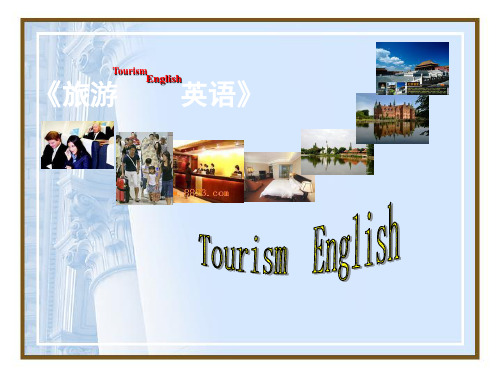
It also should be noted that another large number of tourists are from mature travel. As the world population is aging especially in the developed countries, mature travel will undoubtedly become a prosperous business in tourism industry.
B: Really? I like her song “you and me” very much, and the ceremony impressed me a lot! Oh, Hong, this is Lina, Carol, windy and Monica. (Kate introduces Li Hong to her friends) A: Hello, everyone! Welcome to Beijing! (At this moment, two gentlemen are coming.) C: Kate, here we are. D: Sorry for being late. B: Never mind. I guess you are attracted by the beauty of the airport, aren’t you? Oh, this is John and Peter. And this is our guide Miss Li Hong. C&D: Glad to meet you!
B: Likewise. Thank you for coming to meet us. A: My pleasure. How was the flight, Miss Anderson? It
Unit1《旅游英语》PPT课件
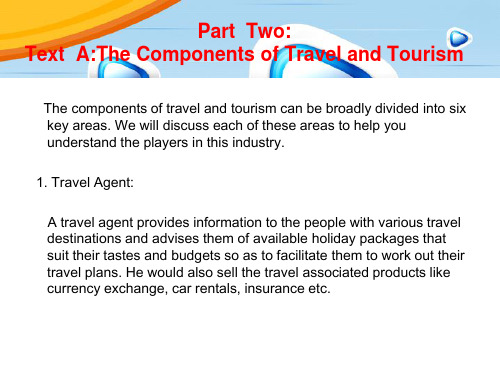
This component consists of those who provide accommodations to people in the form of hotels, resorts, apartments, camps, guesthouses etc. The accommodations may be marketed individually or through the tour operators in the form of package. Direct marketing may require huge costs on advertisements while sales through a tour operator may guarantee the occupancy rate throughout a holiday season. These service providers also take care of the catering needs of the people by providing them with huge cafeterias, various fast food outlets in house or in the form of a galleria.
(Adapted from Technofunc)
Part Three: Text B: A Brief History of Tourism
The history of tourism can be traced back to ancient years. As ancient world empires grew in Africa, Asia and the Middle East, the infrastructure necessary for travel such as land routes and water ways were created and vehicles and other means for travel were developed. During the Egyptian dynasties, travel for both business and pleasure began to flourish and hospitality centers were built along major routes and in the cities to accommodate travelers travelling between central government posts and outlying territories. At the height of the Assyrian empire, the means of travel were improved, the roads were improved, and markers were established to indicate distances and directions. Later, the Persians made further improvement to the road systems and developed four-wheeled carriages for transportation.
unit 1 《新编旅游英语》PPT课件

adj.
航空的, 生活在空气中的
sightseeing n.
观光
excursion
n.
远足, 游览, 短程旅行
approximately adv.
近似地, 大约
segment
n.
段, 节, 片断
domestic
adj.
国内的
Text A Travel as an Industry
confine fare charter supply accessible location cruise excursion freighter ferry
transportation n.
运输, 运送
Text A Travel as an Industry
maritime
entertain ferry wholesale group likewise high-rise motel
adj. 海上的, 海事的, 海运的
v.
娱乐, 招待
v.
渡运,运送
n.
Unit One
Text A Travel as an Industry Text B The Vacation and Leisure Traveler Supplementary Reading Basic Approaches to the Study of Tourism (I)
Text A Travel as an Industry
Text A Travel as an Industry
Notes hospitality industry餐旅业:狭义上指 “食宿”,即住宿业(lodging industry)与 餐饮业(food service industry);广义上指 俱乐部、休闲教育会议中心、会议管理、度 假旅馆、旅馆管理、餐饮管理、餐馆管理、 娱乐、航空公司、休闲服务、观光与旅游服 务、主题公园管理等领域。
旅游英语第一章
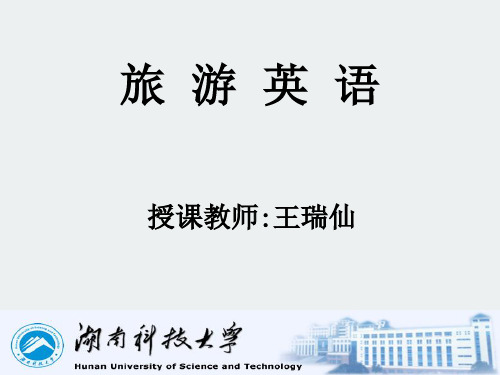
• That’s very considerate of you.
2. About Itinerary
• Tourist arrival
Text Why People Travel?
• Ultimately at the top of the hierarchy
Two aspects of leisure were and are important in promoting
tourism: the time available for leisure, and people’s attitude toward leisure.
• Today, in many countries, elaborate road systems have been built so that a person can go from border to
2. About Itinerary
• itinerary • finalize
• 旅行路线,指南 • 把…最后定下来
• Please read it carefully to see if there is a need for any changes.
• A visit to a community center in Shanghai has also been arranged at your request.
• 可随意支配收入
• discretionary income
• disposable income
• 一般地
• by and large
• 大规模地
- 1、下载文档前请自行甄别文档内容的完整性,平台不提供额外的编辑、内容补充、找答案等附加服务。
- 2、"仅部分预览"的文档,不可在线预览部分如存在完整性等问题,可反馈申请退款(可完整预览的文档不适用该条件!)。
- 3、如文档侵犯您的权益,请联系客服反馈,我们会尽快为您处理(人工客服工作时间:9:00-18:30)。
• Yes.
• 3. When and where do the boat train leave from?
• The boat train leaves Victoria Station at 8:00.
• 4. Where do passengers show their boat tickets?
• 2. T The man wants a ticket with a cabin for two. • 3. F The ticket will be 15 pounds. • 4. T The man wants 300 pounds of traveller’s cheques. • 5. F if people want to cash the cheque, they need to sign their
Reading
• Domestic Typical Travelling Routes
Domestic Typical Travelling Routes
• a. Answer the following questions according to the Passage.
• 1. Exemplify some famous scenic spots in Beijing. • The Great Wall, the Forbidden City, Tian An Men Square, the Ming Tomb • 2. What are the characteristics of the landscape in Guilin? • The landscape is characterized by terraced rice paddies, water buffalos,
旅游英语Unit_图文.ppt
Unit Objectives (单元目标)
• After learning this unit, you should • ——understand what and how to give travel
information; • ——master the basic words and expressions
参考译文
• A:您好,要预订船票吗? • B:下星期有开往汉堡的船吗? • A:有,下星期三纽卡斯尔号将由南安普顿开往汉堡。 • B:好的,能给我订一间二人船舱吗? • A:我看一下。是的,可以(指船舱位置图表)这间怎么样? • B:这间很好,我订了。 • A:请您填好这张卡片。 • B:(填好之后)好了,给您。 • A:请您坐等一下,我来填写票单,只一会儿就好。 • B:那劳驾了。 • A:这是您的票。一共50英镑。 • B:给您钱。我们什么时间可以登船呢?您能告诉我怎么样登船吗?有登船专列吗?如果有的话,
names at the top.
Dialogue 2
• b. Listen to the dialogue and answer these questions.
• 1. When do the passengers abroad?
• At 12:00 noon on Wednesday.
• 2. Is there a 来自oat train?•
At the gate.
• 5. Where can the man get traveller’s cheques?
•
At that corner.
Dialogue 2
• c. Listen to the dialogue again and supply the missing words.
• 1. Yes, that one will be all right. I’ll ___ take it.____. • 2. Will you please ___ fill out ___ this card? • 3. Will you sit down for a moment while I __ make out ___ the
Practice Materials 实训材料
• Listening • Dialogue 1 • a. Listen to Dialogue One and decide whether each
of the following sentences is true (T) or false (F).
September 13. • 4. ___F___ The fare for one-way ticket is $196. • 5. ___T___ The man reserves the Flight 807 finally.
Dialogue 1
• b. Listen to the dialogue and answer these questions.
票已订完。 • B: 那还有别的吗? • A: 有一次航班在九月13日周二上午9:30起飞。我能为您订个座位吗? • B: 哦... 是直航对吗? • A: 是的。您愿意订头等舱还是经济舱的机票? • B: 我想订头等舱的机票。多少钱? • A: 单程是176美元。 • B: 好的,我将订周二9:30的机票。 • A: 一张807次航班周二早晨9:30飞往波斯顿的机票。对吗,先生? • B: 对。你能把我放到12号等候名单中吗? • A: 当然可以。请您告诉您的名字和联系方式。 • B: 我叫Louis Anderson。52378651您能和我联系。 • A: 若取消我将通知您。 • B: 非常感谢。 • A: 不客气。
about travel information; • ——get some cultural knowledge about travel
information; • ——find ways to improve your writing skills
about Letters on Travel Reservations; • ——be familiar with some domestic typical
Types of Tours 旅游类型
• 1. inclusive tour(包价旅游) • 2. Ecotourism(生态旅游) • 3. fly-drive package tour(自驾游) • 4. conducted tour(有导游陪同的旅游)
• 5. foreign individual/independent tour(散客旅游) • 6. culture-oriented travel (文化旅游) • 7. escorted tour(全程陪同旅游) • 8. cruise(豪华游艇旅游) • 9. leisure travel(休闲旅游) • 10. special interest tour(专门兴趣旅游) • 11 Agricultural tourism(农业观光旅游) • 12. sports tourism(体育旅游)
Dialogue 2
• a. Listen to Dialogue One and decide whether each of the following sentences is true (T) or false (F).
• 1. F The S.S Newcastle is sailing for Hamburg form Northampton next Wednesday.
Dialogue 1
• c. Listen to the dialogue again and supply the missing words.
• 1. I’m sorry we are all booked up for Flight 802 on that day. • 2. Shall I book you a seat? • 3. You want to go first class or coach? • 4. Can you also put me on the waiting list for the 12th?
travelling routes
Background Knowledge 背景知识
• When traveling, we may choose to travel by ourselves or attend package tours organized by the travel agencies that attend to the details of transportation, itinerary, and accommodations for travelers. We can also book train tickets, air tickets or passages there.
• 1. What’s the name of the airline company? • The United Airlines. • 2. When does the man want to fly? • Monday, September 12. • 3. Is Flight 807 a direct flight? • Yes. • 4. What’s the man’s name? • Louis Anderson. • 5. What’s the man’s telephone number? • 52378651.
又从哪里发车呢? • A:是的,有登船专列。客轮于星期三中午12点启航。登船专列8点钟由维多利亚车站出发,开往
南安普顿港。您只需在车站入口处出示您的船票,就会准许您进站登车的。如果启航时间有临时变 动的话,我们会电话和您联系。 • B:很好,谢谢。还有,这里有以可兑换旅行支票的地方吗? • A:有的,就在那边的柜台,先生。 • B:(交给接待员300英镑兑换旅行支票)早安,我想换300英镑的旅行支票。10镑一张的换200英 镑,5英镑一张的换100英镑,谢谢! • A:请稍等。请在这里签字好吗中,在左上角,当您想把它们再兑换成现金时,只需在底边处签名 即可。 • B:明白了。(在支票上一一签名)好了,签完了。
